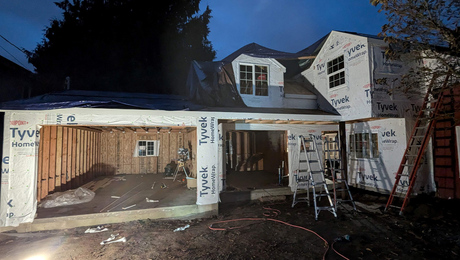I believe that most ICF webs are made from polypropylene. Polypropylene does not have a substantially long lifetime when used in everyday items where it often becomes brittle and breaks apart.
Considering ICF construction, many materials that you want to be permanently attached are in fact screwed to, and held up by, these polypropylene webs. I was just wondering if anyone has encountered a situation where ICF webs deteriorated? Is this a potential long term concern or just too much thinking about a simple thing?















Replies
I believe oxidation from exposure to air or sunlight is what makes most plastics break down. Those conditions would be minimized or eliminated in an ICF.
I agree partially, especially regarding the sunlight, but...
Several years ago, I had several polypropylene 5-gallon water bottles. A couple were left outside in the sun and a couple were stored in the garage completely out of sunlight. The outside ones were completely gone over just one summer. The garage bottles lasted several years, but they too eventually became very brittle and fell apart. I have a similar polyethylene water bottle that has been kept in the garage for 10+ years and it seems perfectly fine. I do live in a really sunny and hot place, so maybe this is an abnormal result?
Not exactly a scientific test/observation, but this is what got me thinking about the ICF webs.
I'm glad that you brought this up. Like other plastics, this application needs time for science and the industry to discover under what conditions it might be inadequate.
While it's easy to predict what any ICF company's sales department will say, only the results of real testing over time will tell the tale.
Reminds me, once again, not to get too excited by the fanfare and the parade. I'll let the bandwagon roll down the road for a while, see if it stays on track.
If I judged the smell I detected when I cut them correctly, Amvic's webs are polystyrene, the same polymer that the foam is made out of. The webs will last longer than the foam, which has a more than adequate lifetime.
Well, according to Amvic's own website, their webs are made of recycled polypropylene.
It seems that all ICF webs are made from polypropylene.
As for polystyrene, I may have to agree that it seems quite stable. In the same garage where my polypropylene water bottles deteriorated, I used some polystyrene to seal around a window and it looks just fine after many years.
The webs though are my concern, and it is not just the heat that can cause problems since some plastics become very brittle when cold.
On the other hand, no one here at Breaktime has said anything about having a problem with their ICF webs, so I just don't know.
Yep, the website does indeed say that. It's also clear that they've changed their web design and added a corner support piece since the last time I used them.
PP is plenty stable if kept out of sunlight which tends to embrittle it. The same goes for polystyrene, PVC and most of the other thermoplastics to different degrees. Protected from sun, these materials have environmental half-lives of thousands to tens of thousands of years, so I think they'll hold your drywall just fine.
I'm only familiar with PolySteel ICFs, which have steel ties and plates. I don't really like the thermal bridging, but I guess it eliminates this concern.
Forrst
Earlier in my ICF research, I eliminated Polysteel for some reason that I cannot remember now, but they may be back in my list exactly for their steel webs.
I think Polysteel is the only ICF manufacturer that does not use polypropylene webs.
gerrha,
Integra Spec has polystyrene webs.
The company is quite pleased with themselves about it too. Their point is that, with polystyrene, the foam adheres much better to the portion of the web system cast into the foam than if it was some other plastic.
Ron
Most plastics deteriorate (harden and get brittle) from exposure to uv light over a long period of time. So will most foam given enough time.
I can't imagine leaving ICF exposed to sun light that long. Interior sides need to be covered anyway to achieve a fire rating, so it shouldn't be an issue.
I have seen polypropylene gas lines that have been buried for 12 years and they appear to be as good as the day they were installed.
I don't think it is a big deal if it isn't exposed to sunlight.
gerrha
Crosslinked polyproplene has a long history of durability.. I've been selling forklifts with tanks made from that material and on average they've held up better than the steel tanks that replaced them..
Plus it is fully encased in concrete. There is no room for it to move.lack of movement means it can not evaoprate. That concrete is reenforced with steal rebar giving it tremendous strength and solidarity.
Just for a note your licence plate is held on with that same material. considering the vibration and exposure to wind etc.. you see very few licences plates by the side of the road don't you?